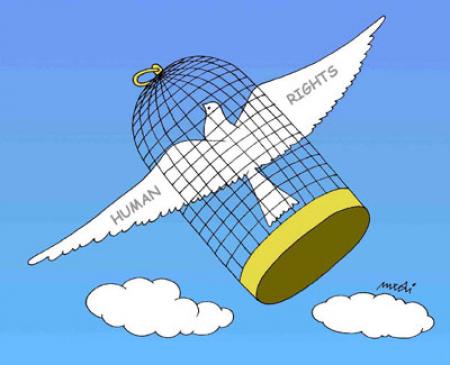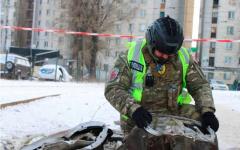Політика
Україна
«Пост-конфліктне правосуддя в Україні». Міжнародна наукова конференція
Українська Гельсінська спілка з прав людини, Європейське товариство міжнародного права і Українська асоціація міжнародного права повідомляють про проведення спільної міжнародної конференції “Пост-конфліктне правосуддя в Україні”.

Конференція відбудеться в Києві 26-27 травня 2017 року у Президент Готелі.
У конференції візьмуть участь провідні експерти з міжнародного права з України, США, Австралії, Азербайджану, Великої Британії, Данії, Італії, Казахстану, Канади, Нідерландів, Німеччини, Норвегії, Франції, Хорватії та інших країн. Серед спікерів – спеціальний доповідач ООН щодо сприяння встановленню істини, справедливості, відшкодування та гарантій неповторення військових конфліктів, судді Європейського суду з прав людини, судді міжнародних трибуналів з розгляду воєнних конфліктів у Югославії та Руанді, один зі співавторів Римського статуту.
Більше п’ятдесяти авторитетних вчених і експертів будуть дискутувати про втілення стандартів міжнародного права в галузі прав людини і міжнародного гуманітарного права під час і після збройного конфлікту; використання механізмів пост-конфліктного правосуддя для «гібридних» збройних конфліктів; позитивні зобов’язання держави за міжнародним кримінальним правом; роль міжнародних судових органів; комісії зі встановлення істини; амністії; процес пост-конфліктного примирення; відшкодування шкоди жертвам збройних конфліктів тощо.
Програма заходу – нижче. Робоча мова – англійська.

Joint Conference of the European Society of International Law, the Ukrainian Helsinki Union for Human Rights and the Ukrainian Association of International Law:
‘Post-Conflict Justice in Ukraine’
Kyiv
25-27 May 2017
Draft programme
- Thursday 25 MAY
|
16:45 – 18:45 |
Pre-conference event: Screening of the Peabody Award-winning film: “Soft Vengeance: Albie Sachs and the New South Africa” |
Opening remarks by Judge Ganna Yudkivska |
|
18:00 – 19:00 |
Philippe Sands: Introductory talk on the book “East West Street” and the film “My Nazi Legacy”
Questions and Answers: Philippe Sands, Judge Ganna Yudkivska, Judge Ksenija Turković, Arkadiy Bushchenko
|
Moderated by Mykola Gnatovskyy |
|
19:00 – 20:30 |
Screening of the film “My Nazi Legacy”
|
|
|
20:30 |
Cocktail (Dinner) |
|
- Friday 26 MAY
|
9:00 – 9:30 |
Opening ceremony: (Video) Greeting by President of Ukraine, Petro Poroshenko André Nollkaemper (President of ESIL; University of Amsterdam) Pavlo Klimkin (Minister of Foreign Affairs of Ukraine) Mary L. Yovanovitch (the Extraordinary and Plenipotentiary Ambassador of the USA to Ukraine) Arkadiy Bushchenko (Executive Director of the Ukrainian Helsinki Human Rights Union) Ganna Yudkivska (Judge, Section President of ECtHR, Academy of Advocacy of Ukraine) Mykola Gnatovskyy (President of the European Committee for the Prevention of Torture, Taras Shevchenko National University of Kyiv)
|
|
|
9:30 – 11:15 |
Plenary Session: “Contemporary Challenges for Transitional Justice” |
Moderated by André Nollkaemper |
|
Taking stock of transitional justice: view by the Special Rapporteur on the Promotion of Truth, Justice, Reparations and Guarantees of Non-Recurrence |
Pablo de Greiff (UN Special Rapporteur, New York University) |
|
|
Justice in conflict-affected situations -- changing and charging the narrative |
Mark Kersten (London School of Economics) |
|
|
The Challenges of Transitional Justice during Conflict |
Sarah Nouwen (University of Cambridge) |
|
|
Courting Failure: When are International Criminal Courts Likely to Be Believed by Local Audiences? |
Marko Milanovic (University of Nottingham) |
|
|
10:15 – 11:45 |
Coffee break |
|
|
11:45 – 13:15 |
Parallel Workshops
|
|
|
Workshop 1: “Can the International Criminal Court Play a Constructive Role for the Post-Conflict Settlement in Ukraine?” |
Moderated by
|
|
|
What Can the International Criminal Court Do to Address the Conflict in Ukraine? |
Iryna Marchuk |
|
|
The Eleventh Dimension of the International Criminal Courts: Collective Memory and Social Systems |
Dmytro Koval |
|
|
How, When and Why: the ICC’s Competence to Review Completed Domestic Proceedings |
Gaiane Nuridzhanian |
|
|
Acceptance of International Criminal Justice in Ukraine |
Valentyna Polunina |
|
|
Workshop 2: “A truth commission for Ukraine: Establishing the historical truth and fighting today’s propaganda?” |
Moderated by Mark Kersten |
|
|
Post-conflict justice in Ukraine: Between accountability and social reconstruction |
Mindia Vashakmadze |
|
|
Turning to Truth: The Value of a Truth Commission in Ukraine’s Post-Conflict |
Ilya Nuzov |
|
|
Ukrainian Memory Laws from the European Legal Perspective |
Uladzislau Belavusau |
|
|
Truth Commissions and National NGOs: Establishing the Truth Together |
Oleg Martynenko |
|
|
The philosophical foundations of transitional justice |
Natalia Satokhina |
|
|
13:15 – 14:15 |
Lunch |
|
|
14:15 – 15:45 |
Parallel Workshops
|
|
|
Workshop 3: “Reparations for victims of the armed conflict” |
Moderated by Judge Kseniya Turković |
|
|
The Right to a Remedy and Reparation for Victims of the Armed Conflict in Ukraine: Challenges and Opportunities |
Vito Todeschini |
|
|
International legal remedies for human rights violations on the Ukrainian territories outside the control of the Ukrainian authorities |
Antal Berkes |
|
|
Post-Conflict Reparation: Ukrainian remedies of restitution of property in the context of the jurisprudence of the European Court of Human Rights |
Tetyana Antsupova |
|
|
The Question of Reparations for Damage Caused by the Armed Conflict in the East of Ukraine |
Alla Blaga |
|
|
Workshop 4: “Is there an existing model of post-conflict justice suitable for Ukraine? (Does the Anna Karenina principle apply to post-conflict justice?)” |
Moderated by Arkadiy Bushchenko |
|
|
Internationalized Justice in Ukraine |
Eric A.Witte Christian De Vos |
|
|
Reassessing Vetting and the Judiciary – Some Reflections in the Light of the Ukrainian Model |
Jacopo Roberti di Sarsina |
|
|
Transitional Justice for post-Putin Russia in the context of legal interests of Ukraine and other affected states
|
Nikolay Bobrinskiy |
|
|
Transitional Justice: Interplay of Stakeholders
|
Oleksii Plotnikov |
|
|
‘Specialist Chambers of Ukraine’ in The Hague; A suitable post-conflict judicial mechanism? |
Michail Vagias |
|
|
15:45 – 16:15 |
Coffee break |
|
|
|
||
|
16:15 – 17:15 |
Book presentation by Sergey Sayapin “The Situation in Ukraine since 2014: jus ad bellum, jus in bello, jus post bellum” |
Moderated by Judge Ksenia Turković |
|
17:15 – 18:30 |
Keynote lecture by Prof. M. Cherif Bassiouni “The Future of Post-Conflict Justice in Light of Contemporary Low Level Conflicts and the Use of Automatic Weapons Systems” and Q&A session (Skype) |
Moderated by Judge Ganna Yudkivska and Marko Milanovic |
|
19:00 |
Dinner |
|
|
|
||
|
|
||
|
9:30 – 11:00 |
Plenary Session: “Positive obligations for the state under international criminal law” |
Moderated by Marko Milanovic |
|
|
Post-Conflict Justice – Experiences from the ICTR context |
Erik Møse (Judge of the ECtHR, former President of ICTR) |
|
|
Fighting impunity for gross human rights violations in post-conflict societies – case law of the European Court of Human Rights |
Kseniya Turković (Judge of the ECtHR, University of Zagreb) |
|
|
The role of parliaments in recognizing and preventing international crimes |
Larissa van den Herik (Leiden University) |
|
|
National implementation of international criminal law: are Eastern European states able to prosecute international crimes? |
Gleb Bogush (Lomonosov Moscow State University) |
|
11:00 – 11:30 |
Coffee break |
|
|
11:30 – 13:00 |
Keynote lecture by Judge Albie Sachs “Meeting the Man Who Put the Bomb in my Car: Former Constitutional Court Justice Albie Sachs speaks about transitional justice in South Africa and Kenya” |
Moderated by Judge Ganna Yudkivska |
|
13:00 –14:00 |
Lunch |
|
|
14:00 – 15:30 |
Workshop 5 “Accountability for IHL violations” |
Moderated by Olga Butkevych |
|
Analysis of Accountability Standards Under International Humanitarian Law and Justice Mechanisms in the Government of Ukraine to Prosecute such Violations |
Wayne Jordash
|
|
|
The law and practice of negotiating justice after armed conflicts: A framework for post-conflict justice in eastern Ukraine? |
Asli Ozcelik-Olcay |
|
|
Accountability for armed conflict violations through the lenses of cultural property |
Kateryna Busol |
|
|
Total Impunity in the ATO Zone: Investigations into Illegal Detentions and Forced Labour |
Nadia Volkova |
|
|
Workshop 6 “ECHR and other human rights bodies” |
Moderated by Maria Issaeva |
|
|
The role of international human rights mechanisms in securing post-conflict justice in relation to the Ukrainian conflict—extraterritoriality issues |
Ralph Wilde |
|
|
The role of the ECHR and other human rights bodies during the Ukrainian conflict, its eventual settlement and aftermath |
Lilian Apostol |
|
|
What impact the events in Crimea and Donbas might have on the ECtHR case-law under Article 1 of Protocol 1 to the ECHR |
Ivan Lishchyna |
|
|
The Impact of European Court of Human Rights’ jurisprudence concerning property rights on the rights of IDPs in Ukraine |
Gulara Guliyeva |
|
|
Human Rights Law and Humanitarian Law as part of the post-conflict legal framework: a tenable duo? |
Alessandra La Vaccara |
|
|
Human Rights and Times of Crisis: Justice, Terror and the Political Psychology of the Body |
John R. Morss |
|
|
15:30 – 16:00 |
Coffee break
|
|
|
16:00 – 17:00 |
Debriefing on workshops and conclusions Workshop 1: Gleb Bogush Workshop 2: Mark Kersten Workshop 3: Judge Ksenija Turković Workshop 4: Arkadiy Bushchenko Workshop 5: Olga Butkevych Workshop 6: Maria Issaeva
|
Moderators: Mykola Gnatovskyy and Judge Ganna Yudkivska
|
|
17:00 – 17:30 |
Closing plenary session Pavlo Petrenko (Minister of Justice of Ukraine) Oleksandr Zadorozhniy (President of Ukrainian Society of International Law, IIR Taras Shevchenko National University) Valeriia Lutkovska (Ukraine’s Parliamentary Commissioner for Human Rights) Marko Milanovic Arkadiy Bushchenko Judge Ganna Yudkivska Mykola Gnatovskyy
|
|
This event is made possible by the generous support of the American people through the United States Agency for International Development (USAID) in the framework of the Human Rights in Action Activity implemented by the Ukrainian Helsinki Human Rights Union.
The American people, through the U.S. Agency for International Development (USAID), have provided economic and humanitarian assistance worldwide for 55 years. In Ukraine, USAID’s assistance focuses on three areas: Health and Social Transition, Economic Growth and Democracy and Governance. USAID has provided USD 1.8 bln. technical and humanitarian assistance to Ukraine since 1992.
For additional information about USAID programs in Ukraine, please visit our website: http://ukraine.usaid.gov or our Facebook page at https://www.facebook.com/USAIDUkraine.

















